
Top Finance Software Development Agencies to Work With - February 2026
Introduction
In the past year, finance has rapidly evolved with the rise of AI, tighter compliance demands, and growing consumer expectations for digital access. As we enter February 2026, selecting the right Finance Software Development Agencies has never been more crucial to success.
While many firms are expanding internal teams, hiring specialized Finance Software Development Agencies remains essential for accessing deep expertise, overcoming bandwidth constraints, and achieving cost efficiency. In the sections ahead, we’ll uncover the Top 10 Finance Software Development Agencies shaping the future of financial technology and transformation.
Top 10 Finance Software Development Agencies
1. G & Co.
G & Co. is a premier finance software development company and digital agency for finance that delivers strategic digital solutions for leading financial institutions, fintech disruptors, and enterprise firms.
Recognized for helping the world’s top brands achieve digital transformation, G & Co. specializes in building software for finance companies that prioritizes customer experience, compliance, and scalability. From mobile banking platforms to financial planning tools and internal process automation, their finance software development services support both legacy modernization and innovation-first product design. As a custom finance software development company, G & Co. leverages design-led development to drive measurable results across digital finance strategy, development, and deployment.
G & Co. is a minority business enterprise (MBE), as certified by the National Minority Supplier Development Council (NMSDC). If diversity inclusion is a part of your supplier process, contact us—we may be a great fit for your enterprise.

2. ELEKS
ELEKS is a trusted finance software development company and digital finance agency that develops high-performance, secure, and compliant solutions for global financial services providers.
With decades of experience, ELEKS supports banks, asset managers, and insurance firms through full-scale custom finance software development—from backend infrastructure and core systems to client-facing applications. Known for its partnerships with companies like Barclays and BNP Paribas, ELEKS is a top-tier software development company for finance that ensures regulatory readiness and seamless integration across enterprise systems. Their finance software development services address both operational challenges and market-facing innovation.
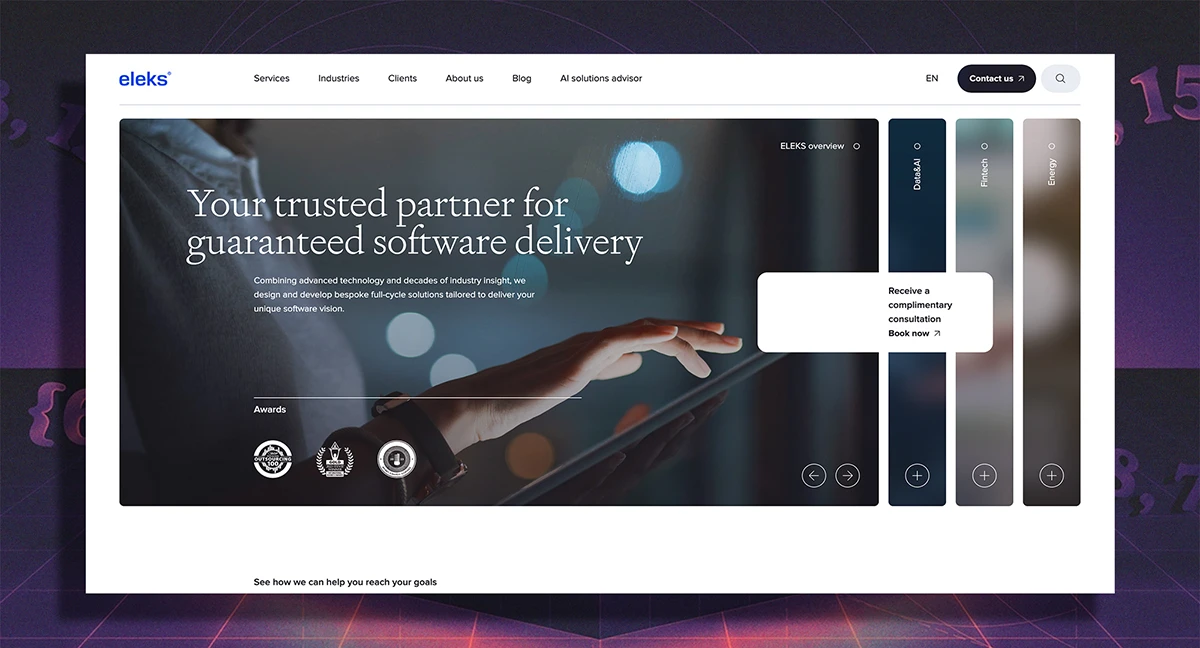
3. Intellectsoft
Intellectsoft is a digital agency for finance and a leading finance software development company delivering end-to-end digital products for banking, fintech, and investment clients.
Combining enterprise engineering with agile development, Intellectsoft creates software for finance companies that includes mobile apps, blockchain solutions, digital wallets, and CRM platforms. Their portfolio features clients such as EuroAccident and the London Stock Exchange Group, reflecting their strength in secure and scalable software development for finance. Intellectsoft’s role as a custom finance software development company is built around tailored solutions that meet the industry’s stringent compliance and performance demands.
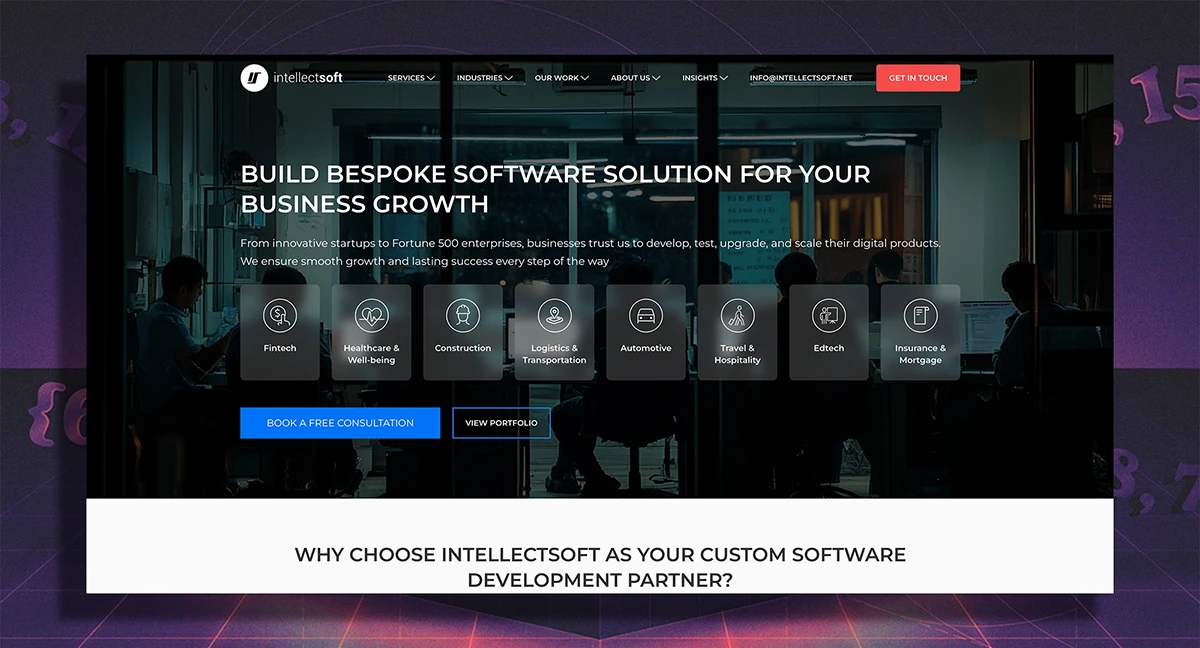
4. Andersen
Andersen is a global finance software development company and digital finance agency providing comprehensive custom finance software development services for banks, lending platforms, and fintechs.
They develop robust and secure systems—from credit scoring engines to mobile banking and trading software—while ensuring each solution adheres to regulatory frameworks like GDPR and PSD2. Their collaborations with global institutions like BNP Paribas and IDFinance underscore their credibility as a finance software development services provider. Andersen is known for rapidly deploying digital platforms and delivering future-ready software for finance companies through scalable architecture and agile delivery.
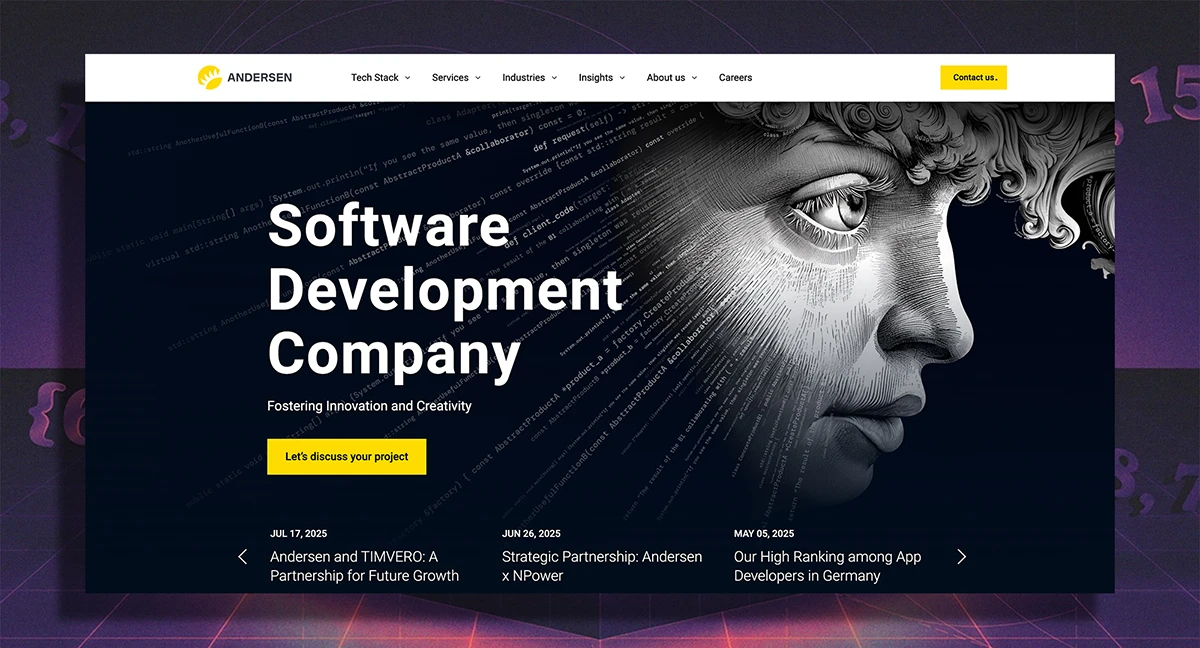
5. Itransition
Itransition is a finance software development company and digital agency for finance known for building mission-critical digital solutions for financial institutions and fintech startups.
Their software development for finance includes ERP systems, trading platforms, investment portals, and digital banking interfaces tailored for performance, compliance, and user experience. With clients such as PayPal and subsidiaries of the World Bank, Itransition brings credibility and scale to every custom finance software development engagement. Their proven methodologies and domain expertise make them a go-to finance software development company for digital transformation in the financial services sector.
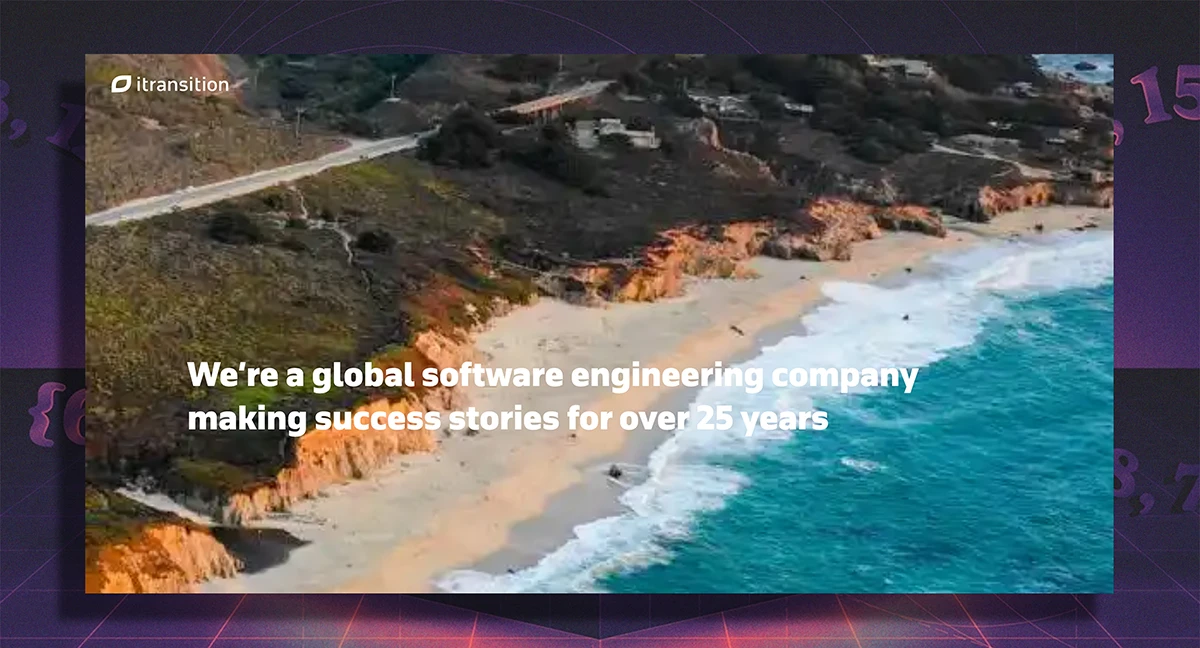
6. EffectiveSoft
EffectiveSoft is a custom finance software development company providing tailored software for finance companies that range from startups to multinational financial organizations.
They deliver solutions including trading systems, analytical dashboards, financial CRMs, and payment systems—all designed to meet evolving digital demands and regulatory compliance. EffectiveSoft is recognized for its domain-specific knowledge and has helped numerous enterprises enhance efficiency through custom-built finance software development services. Their focus on quality, flexibility, and innovation positions them among the most reliable finance software development companies today.
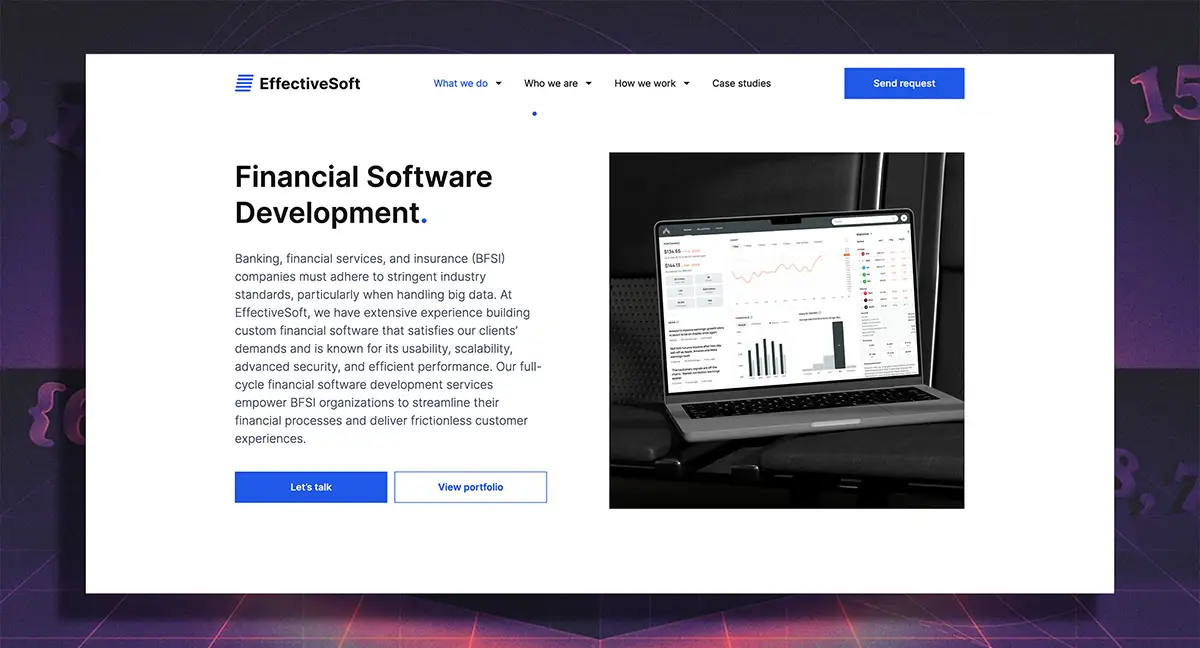
7. Altoros
Altoros is a digital agency for finance and finance software development company helping financial institutions modernize operations through cloud-native development, automation, and AI solutions.
Their work includes building software for finance companies like credit unions, insurance carriers, and neobanks, with capabilities spanning payment systems, investment apps, and risk modeling tools. Altoros has supported organizations such as Alliant Credit Union and Liberty Mutual, showcasing their ability to deliver scalable and compliant custom finance software development. Their focus on high-performance infrastructure and machine learning integration sets them apart in the landscape of finance software development services.
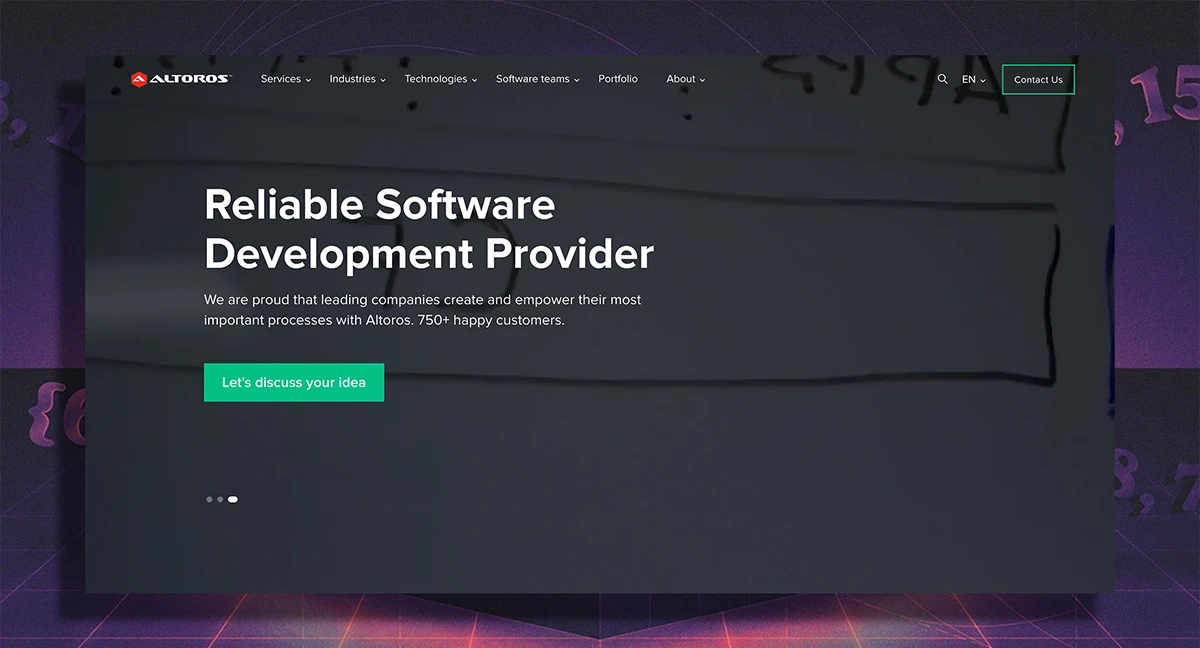
8. Netguru
Netguru is a finance software development company and digital finance agency that helps modern financial companies launch user-friendly, scalable, and secure digital products.
They’ve worked with fintech leaders like Solarisbank and Moonfare to build apps, dashboards, and digital banking platforms that prioritize user experience and performance. Known for their agile approach and design-led thinking, Netguru provides software development for finance that seamlessly blends innovation with reliability. As a custom finance software development company, their work reflects deep understanding of both startup and enterprise-level needs in the financial ecosystem.
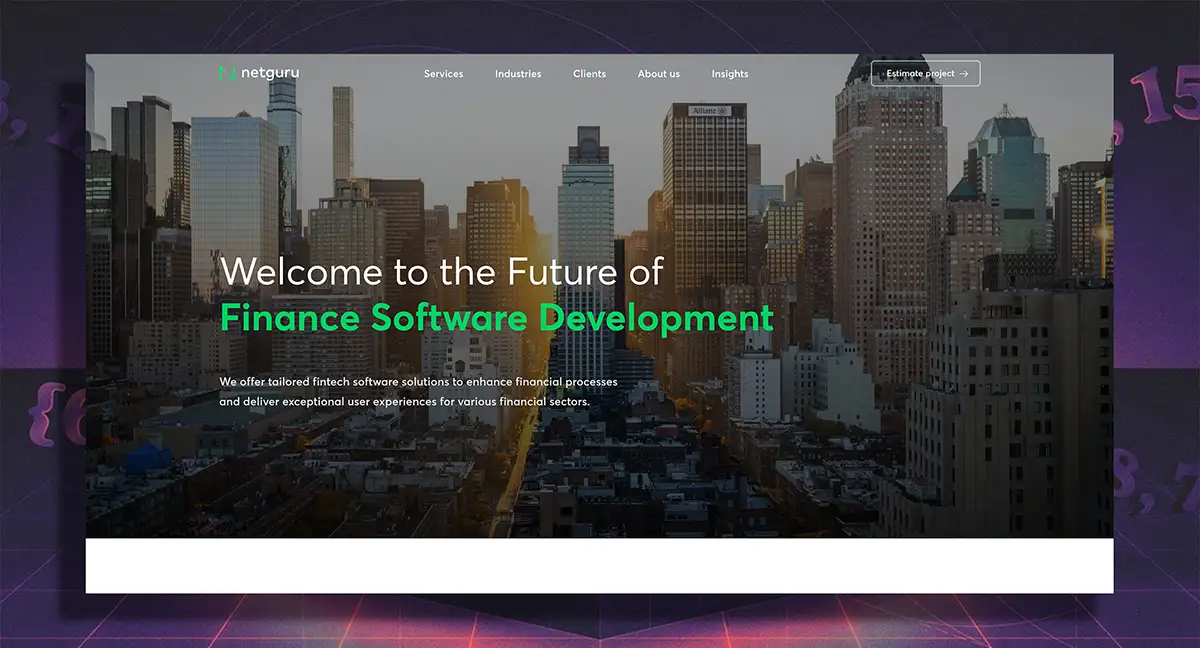
9. S-PRO
S-PRO is a finance software development company and custom finance software development company focused on delivering digital products for fintech startups, neobanks, and established financial institutions.
They provide end-to-end services for building P2P lending platforms, wealth management tools, digital wallets, and investment applications. S-PRO’s agile methodology and focus on regulatory compliance allow them to build software for finance companies that is both secure and highly customizable. Their strong engineering capabilities and fintech expertise position them as a trusted finance software development partner across global markets.
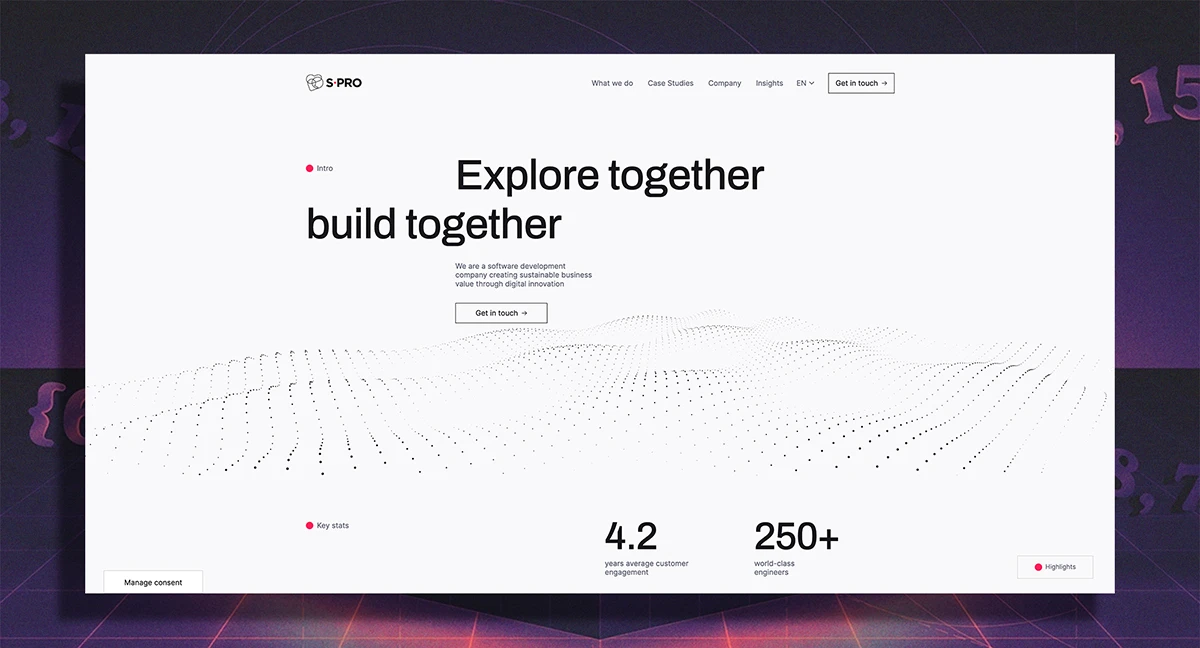
10. Chetu
Chetu is a global finance software development company and software development finance provider offering on-demand and scalable development solutions tailored to banking, lending, and investment businesses.
Their finance software development services include modules for fraud detection, payment processing, insurance automation, and customer portals—all customized to meet specific client needs. With expertise across multiple finance domains, Chetu helps build software for finance companies that supports regulatory frameworks and enhances digital customer engagement. Their end-to-end delivery model and rapid development cycles make them a key player among finance software development companies.
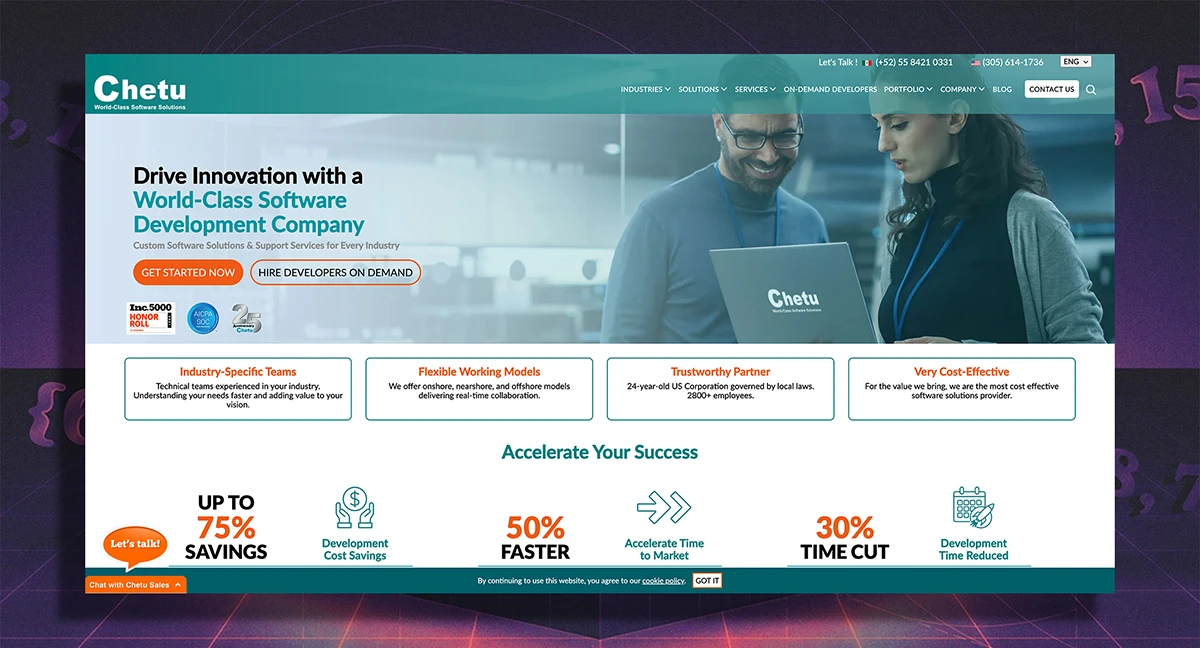
What Is a Finance Software Development Agency?
A Finance Software Development Agency is a specialized firm that designs, builds, and implements digital solutions tailored to the financial services sector, including banking, insurance, investment, and fintech. These agencies possess deep domain expertise in regulatory compliance, data security, and financial workflows, enabling them to create custom platforms such as trading systems, lending portals, mobile banking apps, and financial analytics dashboards. Their value lies in combining technical capabilities—such as cloud architecture, API integrations, and AI automation—with a nuanced understanding of finance-specific needs, allowing financial institutions to enhance operational efficiency, improve customer experiences, and accelerate digital transformation initiatives.
When evaluating a Finance Software Development Agency, understanding its capabilities is critical to assessing its fit for a financial institution’s digital transformation goals. These agencies are uniquely positioned at the intersection of technology and financial expertise, offering tailored solutions that meet the stringent demands of the industry. From building secure platforms that support real-time transactions to developing applications that comply with complex regulatory frameworks, a leading Finance Software Development Agency brings the technical proficiency, industry knowledge, and innovation required to drive meaningful impact. The following capabilities demonstrate how these agencies deliver value across the finance ecosystem—from backend infrastructure to user-facing digital experiences.
In today’s fast-moving financial landscape, institutions require more than just generic technology solutions—they need purpose-built tools that align with the intricacies of the finance industry. This is where Finance Software Development Agencies provide distinct value. These agencies possess a deep understanding of financial operations, regulatory requirements, and digital innovation, enabling them to design and build solutions that drive efficiency, security, and scalability. Whether supporting core banking systems, enabling real-time payments, or creating intuitive client-facing applications, their capabilities reflect a sophisticated blend of technical excellence and financial domain expertise. The following section outlines the key capabilities that define a top-performing Finance Software Development Agency.
What Services Do Finance Software Development Agencies Provide?
Custom Finance Software Development
Finance Software Development Agencies offer custom software development tailored to the unique operational and compliance needs of financial institutions. These solutions are built from the ground up to support workflows like risk modeling, wealth management, payment processing, or loan origination. By developing purpose-built platforms rather than using off-the-shelf software, agencies enable finance companies to scale securely, adapt to evolving regulations, and achieve long-term digital agility.
Core Banking System Development
Agencies design and implement modern core banking systems that handle everything from account management to transaction processing in real-time. These systems serve as the backbone of a financial institution’s digital infrastructure and are engineered to ensure high availability, data integrity, and regulatory compliance. With a focus on modularity and integration, agencies create flexible architectures that allow financial organizations to introduce new services and channels without disrupting operations.
Mobile and Web App Development
Mobile and web applications are essential for client engagement, and Finance Software Development Agencies specialize in designing intuitive, secure, and high-performance digital experiences. Whether developing apps for retail banking, investment tracking, or P2P payments, these agencies build user interfaces and backend systems that meet both regulatory standards and user expectations. Their apps often integrate with APIs, third-party services, and legacy systems to ensure a seamless digital ecosystem.
API Development and Integration
API development is fundamental to modern financial ecosystems, enabling interoperability between banking systems, fintech platforms, and external data providers. Finance Software Development Agencies build robust, secure APIs that facilitate real-time data exchange, automate processes, and extend core system functionality. These integrations support initiatives such as open banking, embedded finance, and third-party service connectivity while maintaining strict data security and compliance standards.
Cloud Migration and Infrastructure Modernization
To improve scalability, reduce costs, and enhance resilience, many financial institutions turn to agencies for cloud migration and infrastructure modernization. These services include refactoring legacy systems, deploying cloud-native architecture, and implementing DevOps pipelines. Finance Software Development Agencies ensure financial firms can operate efficiently in multi-cloud or hybrid-cloud environments while adhering to industry-specific requirements for security, latency, and uptime.
Data Analytics and Business Intelligence
Agencies help finance companies unlock the power of their data through advanced analytics and business intelligence platforms. These solutions aggregate data from multiple sources to deliver real-time dashboards, predictive models, and compliance reporting tools. By leveraging technologies such as AI and machine learning, agencies equip financial organizations with the insights needed for better decision-making, fraud detection, customer segmentation, and portfolio optimization.
Cybersecurity and Compliance Solutions
Given the sensitivity of financial data, agencies place a strong emphasis on building secure systems that meet compliance mandates like PCI DSS, GDPR, SOX, and regional banking regulations. They implement multi-layered security measures such as encryption, access controls, threat detection, and secure authentication. Additionally, they conduct regular audits, risk assessments, and penetration testing to ensure systems remain secure against evolving cyber threats.
Blockchain and Fintech Innovation
For clients exploring next-gen technologies, Finance Software Development Agencies provide expertise in blockchain, tokenization, and digital asset platforms. They build solutions that enable decentralized finance (DeFi), smart contracts, and secure ledger systems for transactions and compliance tracking. These innovations empower financial firms to stay ahead of industry disruption, offering new business models and investment vehicles with enhanced transparency and trust.
CRM and Customer Portal Development
Enhancing customer relationships is a strategic priority, and agencies support this by developing finance-specific CRMs and self-service portals. These tools allow institutions to manage customer lifecycles, track interactions, deliver personalized experiences, and offer secure access to financial products and information. Custom-built CRMs are often integrated with existing systems to centralize data and automate outreach, improving client retention and satisfaction.
Ongoing Support and Maintenance
Beyond initial deployment, Finance Software Development Agencies provide continuous support to ensure long-term system performance and compliance. Services include performance monitoring, bug fixing, regulatory updates, and feature enhancements. This long-term partnership approach allows financial institutions to adapt their platforms in real time as business needs evolve and new technologies emerge.
Let’s kickstart the conversation and design stuff people will love.

How Long Does a Finance Engagement Take to Complete?

Understanding the typical timelines involved in working with a Finance Software Development Agency is essential for aligning project expectations with business goals. Unlike generic software projects, finance-related engagements often involve complex integrations, strict regulatory considerations, and heightened security requirements—all of which impact the overall duration. From initial discovery and compliance scoping to development, testing, and deployment, each phase requires careful coordination and industry-specific expertise. The following section outlines key timeline factors and helps illustrate how long various types of finance software development projects typically take from start to finish.
Project Scope and Complexity
The size and complexity of the project are primary drivers of timeline length when engaging a Finance Software Development Agency. A straightforward mobile banking app with basic functionality may take a few months to complete, while a large-scale core banking platform or custom trading system could extend to 12 months or more. Clients should be prepared for longer timelines if the solution involves complex workflows, numerous user types, or cross-platform functionality, as each feature set requires detailed planning, testing, and regulatory validation.
Regulatory and Compliance Requirements
Compliance with financial regulations such as GDPR, PCI DSS, SOX, and regional banking laws can significantly influence development timelines. Agencies must allocate additional time for legal reviews, audit trails, secure data handling, and documentation to meet both internal compliance protocols and external regulatory standards. The more stringent the compliance environment, the more time is required to develop and test the system to ensure zero compromise on security or legal risk.
Stakeholder Alignment and Decision-Making
Timelines can be extended when there are delays in internal decision-making or frequent shifts in project direction. Finance Software Development Agencies often depend on client-side input for approvals, user feedback, and strategic alignment. Projects move faster when there is a clearly defined stakeholder group, streamlined communication channels, and timely decision-making processes in place on the client side.
Integration Requirements
If the project involves integrating with existing systems—such as core banking software, CRM tools, third-party APIs, or legacy infrastructure—additional time must be allotted for mapping, testing, and validation. Each integration introduces potential dependencies, compatibility challenges, and risk points, particularly in finance where real-time data integrity and system interoperability are critical.
Technology Stack and Architecture
The selection of technology stack also affects delivery timelines. For example, cloud-native applications with microservices architecture may accelerate deployment and future scalability but may require more upfront planning and setup. On the other hand, rebuilding or refactoring legacy code can extend development time. Agencies typically work closely with the client to determine the most efficient architecture that balances performance, cost, and time-to-market.
Team Size and Resourcing
The number of developers, architects, designers, and QA engineers assigned to a project will impact its pace. Finance Software Development Agencies scale teams based on project needs and budgets, but clients should understand that more resources don’t always mean faster delivery—especially if knowledge transfer, onboarding, or cross-team coordination slows momentum. Dedicated teams often yield faster results than shared-resource models.
Testing and Quality Assurance
Given the critical nature of financial applications, extensive testing is required across functionality, performance, security, and compliance dimensions. Agencies conduct unit testing, integration testing, user acceptance testing (UAT), and penetration testing before deployment. The more rigorous the QA process—and the earlier it is integrated into the development cycle—the more time it may take, but it ensures a more stable, secure, and compliant product.
Change Requests and Iterations
Frequent change requests or shifting project priorities can disrupt the established timeline and introduce new requirements mid-development. While agile methodologies used by many Finance Software Development Agencies allow for flexibility, ongoing revisions still require time to re-evaluate design decisions, re-test functionality, and align with regulatory implications, all of which can extend project completion dates.
Client Readiness and Participation
Client-side readiness—such as having a finalized product vision, accessible documentation, and a clear set of KPIs—can greatly influence project efficiency. Projects tend to progress more smoothly when clients are responsive, provide detailed feedback, and have internal alignment across business, legal, and technical teams. Lack of preparation on the client’s part often causes bottlenecks, particularly during requirement gathering and testing stages.
Post-Launch Support and Optimization
Even after launch, agencies typically allocate time for hypercare support, monitoring, and performance optimization. This phase may last several weeks and ensures the application is functioning as expected in a live environment. Any issues identified during this period are addressed promptly, and agencies may implement enhancements based on real-world usage patterns. Clients should factor this period into their overall project timeline to account for full end-to-end delivery.
How Finance Software Development Agencies Price Their Work
When considering a partnership with a Finance Software Development Agency, understanding the pricing structure is critical to making informed investment decisions. Unlike generic software providers, these agencies offer highly specialized services that reflect the complexity, compliance demands, and technical precision required in the finance sector. Pricing can vary widely based on factors such as project scope, technology stack, regulatory requirements, and long-term support needs. The following section explores the key pricing considerations and cost drivers that organizations should be aware of when engaging a Finance Software Development Agency.
Project Scope and Deliverables
Finance Software Development Agencies base their pricing heavily on the scope of the engagement, including the number of features, technical requirements, and desired outcomes. A small, focused application such as a digital wallet will cost significantly less than a full-scale core banking system with multiple modules. The more complex and expansive the deliverables, the more time and expertise required, which directly increases the cost of the engagement.
Engagement Model
Agencies may offer different pricing models such as fixed-price, time-and-materials, or dedicated team structures. Fixed-price models are suited for well-defined, short-term projects with limited scope, while time-and-materials are often used for long-term, evolving projects where flexibility is key. Dedicated team models provide clients with a full team working exclusively on their project and are typically priced on a monthly or quarterly basis, depending on team size and composition.
Regulatory and Security Requirements
Finance Software Development Agencies factor in the depth of regulatory compliance and cybersecurity needed for each project. Projects involving GDPR, PCI DSS, SOC 2, or region-specific financial regulations demand additional planning, documentation, audit preparation, and testing. These added requirements often lead to increased timelines and resource allocations, both of which are reflected in the pricing.
Technology Stack and Tooling
The technologies chosen for the project—such as cloud-native infrastructure, blockchain, machine learning, or advanced data analytics—play a key role in pricing. Specialized technologies may require developers with niche skills, third-party licensing fees, or more complex architectures, all of which add to the overall cost. Agencies assess the long-term scalability and security of the tech stack when developing their pricing proposals.
Customization vs. Platform-Based Development
Custom-built finance applications require more time, resources, and testing than solutions based on pre-existing platforms or frameworks. Fully customized systems are designed to meet the client’s unique needs from scratch, which increases development hours and consulting time. In contrast, using modular or low-code platforms can reduce costs but may not provide the same level of flexibility or long-term value.
Integration Requirements
The need to integrate with third-party APIs, legacy systems, core banking software, CRMs, or payment gateways introduces added complexity and cost. Agencies evaluate the number, type, and difficulty of integrations to determine the additional effort required. Complex integrations, especially those involving outdated or undocumented systems, often result in higher pricing due to risk and testing overhead.
Team Composition and Seniority
The makeup of the project team—senior engineers, architects, designers, project managers, compliance specialists—affects the cost of an engagement. Projects requiring a higher concentration of senior-level talent or specialized compliance experts are typically priced at a premium. Finance Software Development Agencies will often provide rate cards for different roles, which collectively inform the final pricing based on resource allocation.
Timeline and Delivery Speed
Accelerated timelines or requests for expedited delivery typically come with premium pricing. Compressing a project schedule may require additional personnel, overtime, or parallel development streams, which increases cost. Conversely, clients with more flexible timelines may benefit from lower rates by allowing the agency to optimize staffing and delivery without incurring additional overhead.
Post-Launch Support and Maintenance
Agencies typically offer support and maintenance as a separate cost item or bundled into ongoing service agreements. These services can include bug fixes, performance tuning, feature enhancements, compliance updates, and 24/7 monitoring. The depth and duration of post-launch support required will influence the pricing model, with mission-critical finance applications often requiring higher ongoing investment.
Geographic Delivery Model
Where the agency’s team is based—onshore, nearshore, or offshore—can significantly impact pricing. Onshore teams generally command higher rates due to labor costs, while nearshore or offshore teams may offer cost advantages with varying levels of oversight and time zone alignment. Many Finance Software Development Agencies offer hybrid delivery models that balance cost with talent quality and responsiveness.
Why Hire a Finance Software Development Agency?

Partnering with a Finance Software Development Agency offers strategic advantages that extend far beyond traditional software development. These agencies combine deep technical expertise with a nuanced understanding of financial operations, compliance requirements, and evolving user expectations. In an industry where security, scalability, and speed to market are critical, Finance Software Development Agencies provide the specialized capabilities needed to build robust, future-ready digital solutions. The following section explores the key reasons why working with a Finance Software Development Agency can be a transformative decision for financial institutions and fintech innovators alike.
Deep Financial Industry Expertise
Finance Software Development Agencies bring specialized knowledge of financial workflows, compliance regulations, and customer expectations that generalist firms often lack. Their familiarity with industry standards—such as KYC, AML, PCI DSS, and PSD2—enables them to build platforms that are not only functional but also secure and regulatory-ready. This domain expertise ensures that financial institutions can avoid costly compliance missteps and deliver solutions that meet the exact needs of their users and stakeholders.
Faster Time-to-Market
Agencies focused on finance are equipped with proven frameworks, reusable components, and industry-specific best practices that accelerate development timelines. By streamlining discovery, development, testing, and deployment phases, these firms help clients launch digital finance products more quickly without compromising quality or security. This speed is crucial in a competitive landscape where first-mover advantage and customer experience are major differentiators.
Scalable, Secure Architecture
Finance Software Development Agencies understand the importance of building scalable infrastructure that can handle high transaction volumes, complex data processing, and evolving business requirements. They design solutions with scalability, uptime, and performance in mind, using architecture patterns that ensure stability as the business grows. Their approach also prioritizes multi-layered security, protecting sensitive financial data from breaches and fraud.
End-to-End Development Capabilities
From initial strategy and UX design to full-stack development and post-launch support, these agencies provide comprehensive service offerings that cover the entire product lifecycle. This integrated approach allows clients to avoid the inefficiencies and miscommunications that can occur when working with multiple vendors. Having a single partner responsible for the full scope of delivery ensures consistency, accountability, and a higher-quality end product.
Access to Niche Technical Talent
Working with a Finance Software Development Agency gives businesses access to highly specialized engineers, architects, and compliance experts who are well-versed in financial platforms and technologies. These professionals often possess experience with fintech APIs, blockchain integrations, trading systems, and AI-powered financial tools—capabilities that are difficult to recruit for internally. This talent pool enables companies to execute complex digital initiatives without building an in-house team from scratch.
Focus on Innovation and Emerging Tech
Agencies stay on the forefront of innovation by continuously exploring advancements in AI, machine learning, blockchain, cloud-native development, and digital identity. They help financial institutions test, prototype, and implement these technologies to gain a competitive edge. By working with an agency that understands both the risks and opportunities of emerging tech, businesses can future-proof their digital infrastructure and stay ahead of market shifts.
Reduced Operational Risk
Agencies mitigate risk by applying structured development methodologies, rigorous QA processes, and security-first design principles. Their familiarity with high-stakes financial environments allows them to anticipate and address potential issues early in the development lifecycle. This proactive approach reduces the likelihood of costly rework, regulatory violations, or system failures post-launch.
Cost Efficiency and Predictable Budgeting
Finance Software Development Agencies provide transparent pricing models and scalable engagement options, helping businesses manage costs while still accessing top-tier expertise. Compared to hiring and retaining a full internal development team with similar experience, working with an agency can be more cost-effective—particularly for projects with a defined scope or fixed delivery timeline. Predictable budgeting and clear milestones also support better financial planning and ROI tracking.
Long-Term Partnership and Support
Many Finance Software Development Agencies structure their engagements around long-term collaboration, offering ongoing maintenance, feature enhancement, and compliance updates well after the initial product launch. This ongoing partnership ensures that systems evolve in parallel with market demands and regulatory changes. Having a reliable agency on hand allows financial institutions to continuously improve their digital products without the burden of internal resource constraints.
How to Choose The Most Reliable Finance Software Development Agencies
Selecting the right Finance Software Development Agency is a critical decision that can directly impact a company’s ability to innovate, stay compliant, and scale effectively in a rapidly evolving financial landscape. With numerous agencies offering overlapping services, businesses must look beyond surface-level credentials to evaluate technical capabilities, industry expertise, and alignment with long-term goals. The following section outlines key criteria and considerations to help organizations identify the ideal partner—one that not only understands software development but also possesses a deep understanding of the finance sector’s unique challenges and requirements.
Proven Experience in the Finance Sector
When evaluating a Finance Software Development Agency, one of the most important factors to assess is their track record in the financial industry. Agencies with proven experience in banking, fintech, insurance, or investment services are more likely to understand the complexities of financial operations, regulatory compliance, and data sensitivity. Reviewing past case studies, industry certifications, and client testimonials can provide insights into how well the agency has delivered finance-specific solutions and whether they have successfully handled challenges similar to your own.
Understanding of Regulatory Compliance
Financial software must meet stringent compliance requirements, including standards like PCI DSS, SOC 2, GDPR, and region-specific banking regulations. A qualified agency should demonstrate a strong understanding of these mandates and provide clear methodologies for incorporating compliance into their development process. This includes audit readiness, secure data handling practices, and the ability to design systems that withstand legal scrutiny across jurisdictions.
Technical Expertise and Stack Alignment
The agency’s technical capabilities should align with your company’s current and future needs, whether you require cloud-native architecture, microservices, API-first development, or support for blockchain and AI technologies. Evaluate their familiarity with your preferred programming languages, frameworks, and deployment environments. A strong Finance Software Development Agency will not only offer up-to-date expertise but also guide you toward the best technology stack to meet your scalability, security, and performance goals.
Depth of Customization Capabilities
Every financial institution has unique workflows, user expectations, and system dependencies. A top-tier agency should offer deep customization capabilities rather than force-fitting off-the-shelf templates. Look for agencies that excel in tailoring platforms, dashboards, and back-end infrastructure to your specific operational models, client segments, and business objectives, while maintaining compliance and performance benchmarks.
Security-First Development Approach
Security is a non-negotiable in finance, and the agency should have well-defined protocols for secure coding, penetration testing, threat modeling, and vulnerability remediation. Ask about their approach to data encryption, multi-factor authentication, role-based access, and incident response planning. An ideal partner will prioritize security from the ground up, integrating risk mitigation practices into each stage of the development lifecycle.
Transparent Communication and Process
A Finance Software Development Agency should offer clear communication channels, detailed project timelines, and structured delivery methodologies such as Agile or Scrum. Transparency around timelines, resource allocation, testing procedures, and stakeholder involvement is essential for keeping projects on track and minimizing surprises. Agencies that provide regular updates and detailed documentation foster trust and ensure alignment throughout the engagement.
Ability to Scale With Business Growth
The right agency will not only deliver on immediate project requirements but also support long-term scalability. Whether through modular system design, cloud infrastructure, or post-launch support, the agency should have a vision for how your digital finance solution will evolve. Ask about their ability to handle versioning, feature expansions, and user growth without compromising performance or compliance.
Post-Launch Support and Maintenance
Post-launch support is critical in the financial space, where even small disruptions can have serious consequences. Evaluate whether the agency offers ongoing maintenance, compliance updates, performance monitoring, and feature enhancements after deployment. A strong partner will provide continuous support to ensure the platform remains secure, efficient, and aligned with shifting user and regulatory expectations.
Cultural Fit and Client Partnership Mentality
Cultural alignment and collaborative mindset can influence the success of a project as much as technical skill. Look for agencies that treat engagements as strategic partnerships, are open to feedback, and invest time in understanding your business goals. A Finance Software Development Agency that acts as an extension of your team will be better positioned to deliver impactful, long-lasting solutions.
15 Questions To Ask Finance Software Development Agencies Before You Hire One

Before selecting a Finance Software Development Agency, it’s essential to ask the right questions to evaluate whether the agency is equipped to meet your specific needs. Given the high stakes of financial software—where security, compliance, and performance are non-negotiable—these questions can uncover critical insights about an agency’s experience, technical approach, and ability to deliver. This section outlines key questions prospective clients should consider to make informed decisions, reduce risk, and ensure a successful engagement with a trusted finance technology partner.
- What experience do you have working with financial institutions or fintech companies?
- Can you provide case studies or success stories related to finance software projects?
- How do you ensure compliance with regulations such as PCI DSS, SOC 2, GDPR, or local financial laws?
- What is your approach to securing sensitive financial data throughout the development process?
- Do you offer custom finance software development, or do you work from existing platforms?
- How do you handle integrations with legacy systems, third-party APIs, or core banking infrastructure?
- What technology stacks do you specialize in, and how do you choose the best stack for finance clients?
- What is your typical project timeline for finance-related software solutions?
- How do you structure your pricing model—fixed, time-and-materials, or dedicated team?
- What is your process for gathering requirements and aligning with business goals in a finance context?
- How do you approach testing for functionality, performance, security, and regulatory compliance?
- What kind of post-launch support, maintenance, and compliance updates do you provide?
- How do you ensure transparency and communication throughout the project lifecycle?
- What types of financial applications have you built—e.g., trading platforms, mobile banking apps, payment systems?
- How do you manage scalability and future growth for financial software solutions?
What experience do you have working with financial institutions or fintech companies?
Finance software presents unique challenges that differ greatly from other industries, including strict regulatory requirements, real-time data handling, and complex transaction processing. Asking about the agency’s direct experience in the finance sector ensures that they are familiar with the industry’s specific demands. An agency with a proven track record in finance will be better prepared to anticipate risks, handle sensitive data securely, and develop solutions that align with financial operations and compliance expectations.
Can you provide case studies or success stories related to finance software projects?
Case studies offer tangible proof of an agency’s ability to deliver successful outcomes within the finance industry. They help reveal how the agency handles challenges, collaborates with clients, and applies its expertise to build impactful solutions. Reviewing these stories allows prospective clients to assess the agency’s range of capabilities, technical execution, and client satisfaction. It also offers a chance to gauge how relevant those past engagements are to their own project needs.
How do you ensure compliance with regulations such as PCI DSS, SOC 2, GDPR, or local financial laws?
Finance software must operate within a tightly regulated environment, and non-compliance can lead to fines, reputational damage, or operational disruptions. It’s essential to understand how a prospective agency handles compliance from the outset. This includes their approach to data handling, audit trails, consent management, and encryption protocols. A thorough response to this question demonstrates the agency’s ability to design systems that are secure, transparent, and legally compliant.
What is your approach to securing sensitive financial data throughout the development process?
Security is one of the most important concerns when building financial applications, as they routinely handle personally identifiable information (PII), payment credentials, and transaction data. A strong agency should implement robust data protection practices during development—such as secure coding, access control, data masking, and vulnerability testing. Asking this question helps verify that the agency treats security as a foundational element, not an afterthought.
Do you offer custom finance software development, or do you work from existing platforms?
Understanding whether an agency builds fully custom solutions or works with pre-built platforms informs the flexibility and uniqueness of the end product. Custom finance software can be tailored to a company’s exact workflows and compliance needs, while platform-based development may offer cost and speed benefits but with limited adaptability. This question helps identify the right balance between customization, cost-efficiency, and future scalability for the client’s specific objectives.
How do you handle integrations with legacy systems, third-party APIs, or core banking infrastructure?
Financial institutions often rely on existing systems and third-party services that cannot be easily replaced. A prospective agency must have the capability to integrate seamlessly with these systems while ensuring data consistency and uptime. By asking this question, clients can determine whether the agency has the technical knowledge and experience to navigate complex integrations that are often essential to maintaining business continuity and regulatory compliance.
What technology stacks do you specialize in, and how do you choose the best stack for finance clients?
The technology stack impacts everything from performance and scalability to security and maintainability. Understanding the agency’s stack preferences and how they select tools and frameworks for financial clients provides insight into their technical thought process. Clients should look for agencies that align with modern, secure, and efficient tech stacks tailored to the specific needs of finance, such as cloud-native infrastructure, event-driven architecture, or blockchain capabilities.
What is your typical project timeline for finance-related software solutions?
Timelines are essential for planning internal resources, product launches, and compliance reviews. Finance software often takes longer than average applications due to complexity and regulatory layers. Asking this question allows clients to set realistic expectations around development cycles and helps them understand how the agency manages deadlines, mitigates delays, and maintains transparency throughout the project lifecycle.
How do you structure your pricing model—fixed, time-and-materials, or dedicated team?
Understanding how the agency structures its pricing enables clients to plan budgets effectively and choose an engagement model that aligns with project goals. Fixed-price models work well for defined scopes, while time-and-materials offer flexibility in evolving projects. A dedicated team may be ideal for long-term or large-scale programs. Asking this question helps identify how costs are managed and what level of transparency and control clients can expect.
What is your process for gathering requirements and aligning with business goals in a finance context?
Successful software development hinges on the agency’s ability to translate complex business requirements into effective digital solutions. In finance, this means accounting for compliance, user roles, transaction flows, and risk mitigation strategies. Asking about the agency’s discovery and requirement-gathering process ensures they take a methodical, consultative approach and prioritize alignment with your business objectives from the start.
How do you approach testing for functionality, performance, security, and regulatory compliance?
Given the critical nature of financial systems, a rigorous testing methodology is vital to ensure stability and trustworthiness. This question helps assess whether the agency includes unit tests, penetration testing, load testing, and compliance verification in their process. Agencies that demonstrate a structured approach to quality assurance show they are equipped to deliver secure and reliable finance software that performs under real-world conditions.
What kind of post-launch support, maintenance, and compliance updates do you provide?
Post-launch needs often include bug fixes, performance enhancements, new features, and regulatory updates. Since financial regulations evolve frequently, continuous support is crucial to maintain compliance and system health. This question helps determine whether the agency provides ongoing services and how responsive and proactive they are in supporting software post-deployment.
How do you ensure transparency and communication throughout the project lifecycle?
Clear communication is critical to ensure milestones are met, blockers are addressed, and expectations are aligned. This question allows clients to evaluate how frequently the agency provides updates, which tools are used (e.g., Jira, Slack, dashboards), and how decision-making is facilitated. Agencies with structured project management processes are more likely to deliver successful outcomes with minimal friction.
What types of financial applications have you built—e.g., trading platforms, mobile banking apps, payment systems?
Understanding the types of financial solutions an agency has developed provides clarity on their areas of specialization. Whether it’s a high-frequency trading platform or a peer-to-peer lending app, specific project experience demonstrates the agency’s ability to meet technical demands and adapt to niche business requirements. This question helps determine whether their experience aligns with the client’s vision and use case.
How do you manage scalability and future growth for financial software solutions?
Financial organizations need software that evolves with growing user bases, transaction volumes, and service offerings. By asking how an agency designs for scalability, clients can assess whether their architecture supports modular expansion, load balancing, and integration with future technologies. This is especially important for businesses planning for rapid growth or expanding into new markets with their digital products.
Searching for the right Finance Software Development Agencies?
In an industry defined by rapid digital innovation, strict regulatory oversight, and rising customer expectations, partnering with a Finance Software Development Agency is no longer a luxury—it’s a strategic necessity. These agencies bring together deep financial domain knowledge and advanced technical capabilities to deliver tailored, scalable, and secure solutions that support long-term growth. Whether it’s launching a new digital banking platform, modernizing legacy systems, or integrating cutting-edge technologies like AI and blockchain, Finance Software Development Agencies offer the expertise, efficiency, and execution needed to remain competitive in a dynamic financial landscape.
G & Co. stands at the forefront of digital transformation in finance, offering the capabilities that define the very best Finance Software Development Agencies. With a proven track record of delivering high-impact solutions for global banks, fintech disruptors, and investment platforms, G & Co. combines regulatory fluency, secure-by-design architecture, and strategic product thinking to help financial institutions scale with confidence. From custom software development to full-platform builds and ongoing optimization, G & Co. is a trusted partner for organizations seeking innovation without compromise.
Submit an inquiry to G & Co. on our contact page or click on the blue "Click to Contact Us" button on the bottom right corner of your screen for your convenience. We look forward to hearing from you.






%20(1).png)




